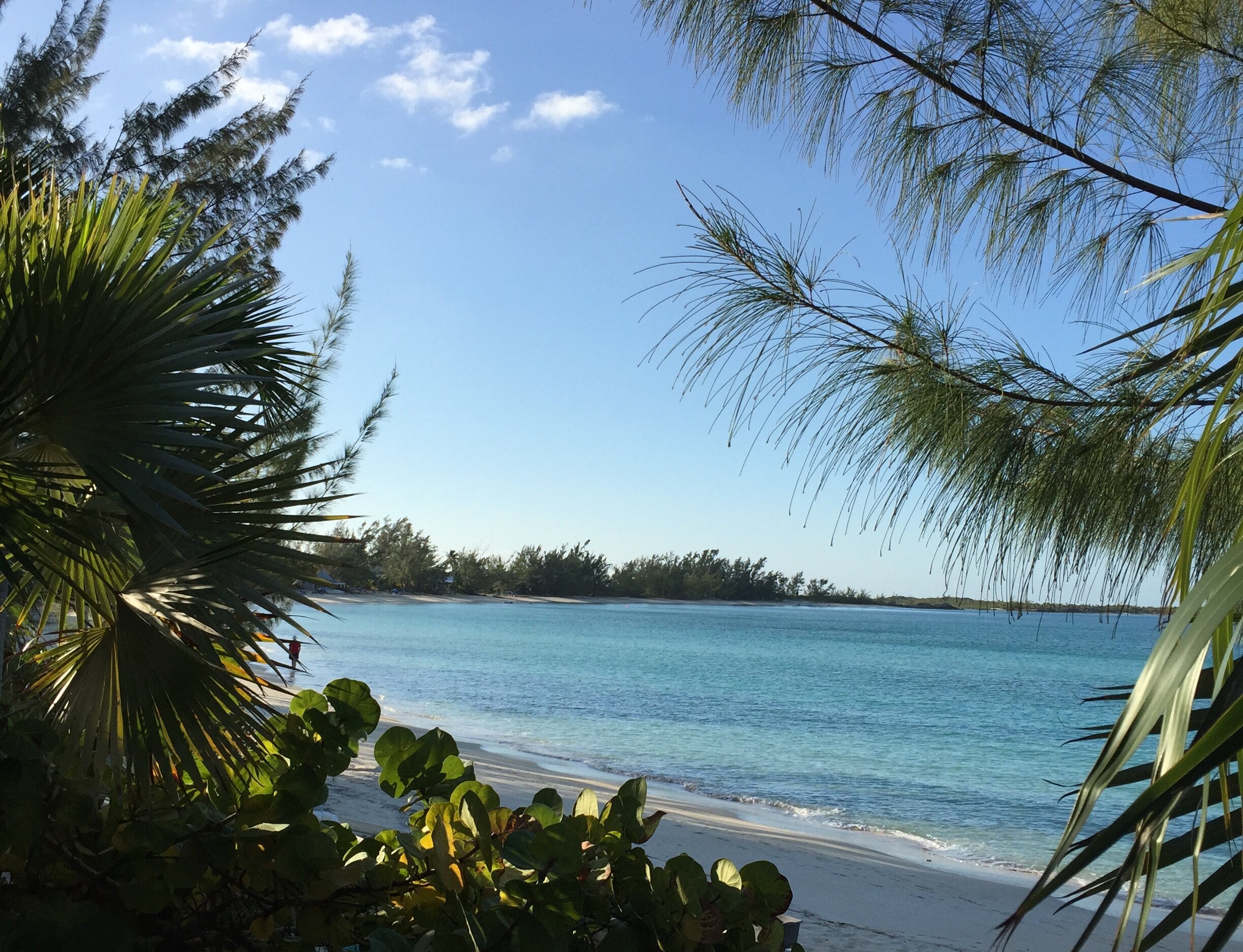I'm in Cat Island.
The place I'm staying is a small beach resort, friendly, home-like, rustic, on Fernandez Bay. For those who know Fernandez Bay you know what that means. Glorious beach. Beautiful nature. You know.
Or, if you're Bahamian, perhaps you don't.
Here's what I mean. I went for a walk this morning along the crescent-moon white-sand beach. The sun was coming up, just peeking above the horizon (which is on the other side of the island anyway). I started at our resort, the Island Hopp Inn, which is almost at the end of the bay. I walked towards the Fernandez Bay resort. On the way I passed small houses on the beach. They didn't look like locals' homes; they looked like holiday homes. And as I passed Fernandez Bay I met a dog who was walking the beach with his owner, an American who, yes, has a holiday home on this bay. We walked the rest of the beach together. She and I talked. She was a university professor like me who has retired early enough to enjoy her retirement and who is able, somehow, to be able with her husband to afford a holiday home in Cat Island (where she has been coming for years) as well as a permanent home in the US. Together we also passed several other people who were walking the beach as well. None of them was Bahamian. I did pass some Bahamians: four people who work at the resort. They were not walking the beach. They were working.
My next observation is a commonplace one. What I observed on Fernandez Bay is the way our country is. Foreigners relax in our country; Bahamians work. But that's not entirely true. The owners of the resorts on this bay are not Bahamian, but they work. The difference is that they are owners of their businesses. They employ Bahamians to work in their businesses. So here, on the beach in my own land, I was the only Bahamian walking the beach (I was working too, mind you). The people who owned the land adjacent to the beach were not Bahamians. The non-Bahamians on this bay form a perimeter of foreign-owned properties which consume the beauty and the peace and quiet. Bahamians do not.
There was a story in the New York Times, I was told (by my research partner), which said that Cat Island is one of the 10 best places in the world to live. Part of me agrees, strongly. Part of me would want to say that the Bahamas as a whole qualifies as one of the 10 best places to live, but as a Bahamian who lives in Nassau I can't say that and be honest about it. As a Bahamian who lives in Nassau and has travelled throughout many of our islands I can't say it either; because in too many of those islands it's not Bahamians who get to live in the best places on those islands at all. (I've since looked for the article and I can't find it—perhaps it's apocryphal.)
But one has to wonder. If Cat Island is really one of the best places to live, why does it have such a small population? Why do young Cat Islanders leave the island and don't come back? What is it that makes the island good for non-Bahamians and not so good for Bahamians?
I know many Cat Islanders in Nassau who say that if they could, they would go home. Why, though, is there an "if" involved? What's missing? What would they need to make them return home? These questions are at the heart of my part of this project. For me, the critical question is what is it that makes Bahamians leave the islands and settlements of their birth and move to Nassau.
The answer—and many of you reading probably think the question is wholly elementary—lies in the availability of economic opportunity in home communities. The ability to make a living in one's community, preferably doing what you would wish to do, what you have trained to do, is at the crux of the matter. For some, too, it is the ability to get an education—the ability to finish high school or college in one's home community; for others, it is the absence of professions and careers that allow them to live outside Nassau (or even in Nassau or The Bahamas as a whole, but that's a different question). What is it that makes it possible, desirable, even, for North Americans, Europeans and Britons to own second or third homes in places like Cat Island, but that prohibits Bahamians from doing the self-same thing?

